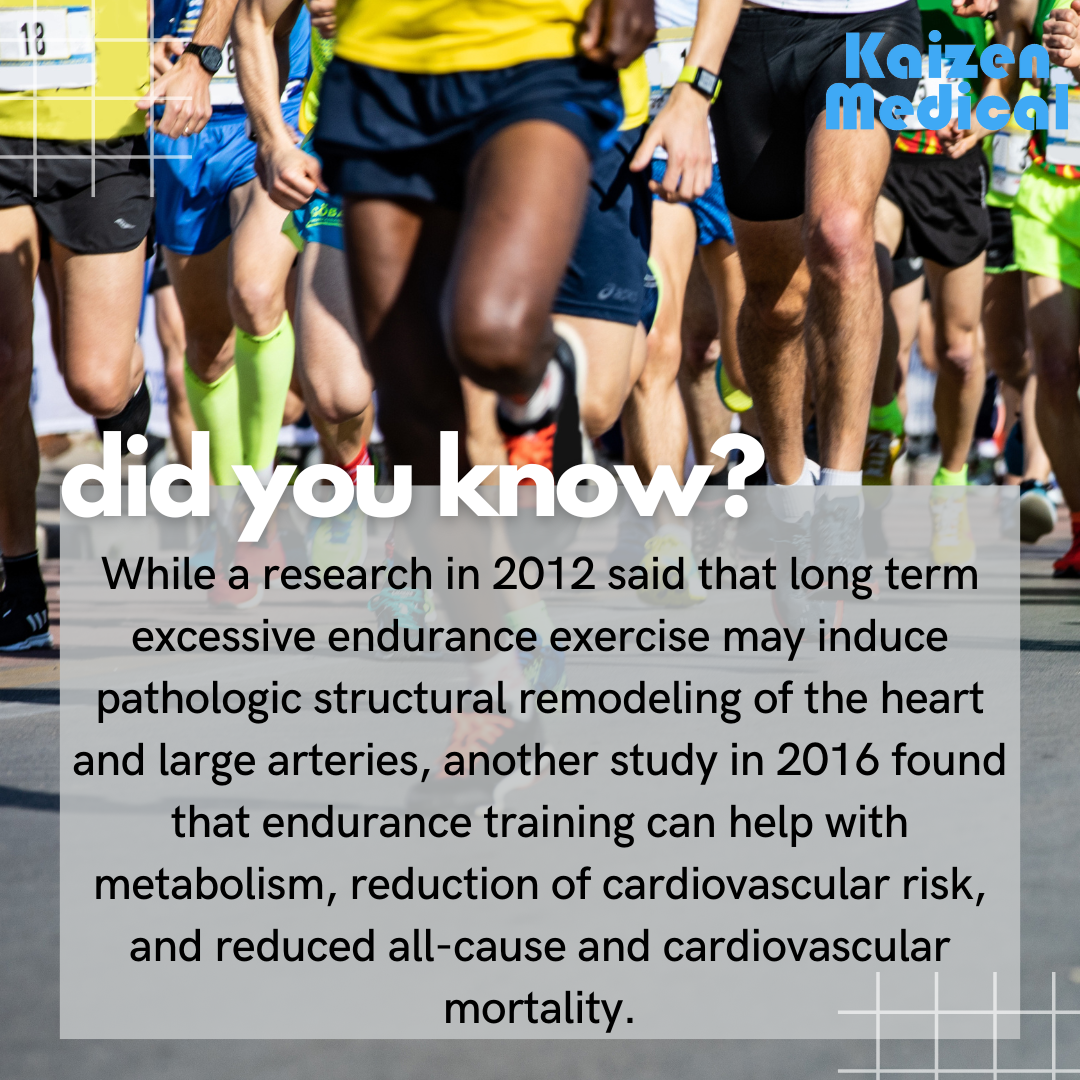Some patients with heart conditions have asked if they can train for a marathon.
They were concerned that endurance training may cause stress and damages to their hearts
A research in 2012 shows that while “a routine of regular exercise is highly effective for prevention and treatment of many common chronic diseases including coronary heart disease (CHD), hypertension, heart failure, obesity, depression, and diabetes mellitus, and improves cardiovascular (CV) health and longevity. Long term excessive endurance exercise may induce pathologic structural remodeling of the heart and large arteries.”[1]
This, however, does not mean that people with heart condition should shun away from endurance exercises. In fact, in a study in 2016, it is said that endurance training can help with metabolism, reduction of cardiovascular risk, and reduced all-cause and cardiovascular mortality.[2]
It is fair to say that running a marathon with heart disease is a complex issue that depends on various factors such as the severity of the heart disease, individual health condition, and medical advice from healthcare professionals.
Here are some precautions to take before embarking on endurance training:
- Consultation with Healthcare Provider
Always consult with a healthcare provider, preferably one familiar with your heart condition, before starting any exercise program or participating in a marathon. They can evaluate your current health status, provide personalized recommendations, and advise on whether running a marathon is safe for you.
- Medical Evaluation
Undergo a thorough medical evaluation, which may include tests such as an electrocardiogram (ECG or EKG), stress test, echocardiogram, or other cardiac assessments. These tests help assess your heart’s function and determine any potential risks associated with marathon running.
- Medication Management
Ensure that your medications are optimized and managed properly. Some heart medications may affect exercise tolerance or have specific considerations during intense physical activity. Your healthcare provider can adjust your medication regimen as needed to support your participation in the marathon.
- Symptom Monitoring
Be vigilant for any signs or symptoms of heart problems, such as chest pain or discomfort, shortness of breath, palpitations, dizziness, or fatigue. If you experience any of these symptoms during training or the marathon itself, stop immediately and seek medical attention.
- Gradual Training
Gradually build up your training regimen under the guidance of a qualified coach or trainer experienced in working with individuals with heart conditions. Avoid sudden increases in exercise intensity or duration, and listen to your body’s signals.
- Hydration and Nutrition
Stay properly hydrated and maintain a balanced diet to support your training and overall health. Adequate hydration is particularly important during endurance events like marathons.
- Rest and Recovery
Prioritize rest and recovery between training sessions to allow your body to recover adequately. Overtraining can exacerbate existing health conditions and increase the risk of complications.
- Emergency Plan
Have an emergency plan in place in case of any medical emergencies during the marathon. Know the location of medical aid stations along the route, carry any necessary medications or medical information with you, and inform a friend or family member about your participation in the event.
In some cases, individuals with well-managed and stable heart conditions may be able to participate in endurance events like marathons, but this decision should be made in collaboration with medical professionals who can closely monitor the person’s health and provide guidance throughout the training and event.
[1] https://www.mayoclinicproceedings.org/article/S0025-6196(12)00473-9/pdf
[2] https://www.ncbi.nlm.nih.gov/pmc/articles/PMC4933620/
About Dr Adrian Mondry
Dr Adrian Mondry is a Hypertension Specialist accredited by the German Hypertension League in Singapore. He was previously a senior consultant in the department of medicine at the National University Hospital and Ng Teng Fong General Hospital (NTFGH), Dr Mondry has more than 30 years of experience in the field of internal medicine.
Dr Adrian Mondry is recognised for his leadership and contributions in establishing the dedicated hypertension clinic within the National University Health System and fast-track deep vein thrombosis service at NTFGH.
Dr Adrian Mondry is fluent in English, German and French.
About Kaizen Medical
Kaizen Medical is located at Mount Elizabeth Novena Specialist Centre, Suite 11-57.
At Kaizen, we provide in depth health care to patients with multi-organs diseases; tackling undifferentiated presentations that cannot be easily assigned to a single organ.


